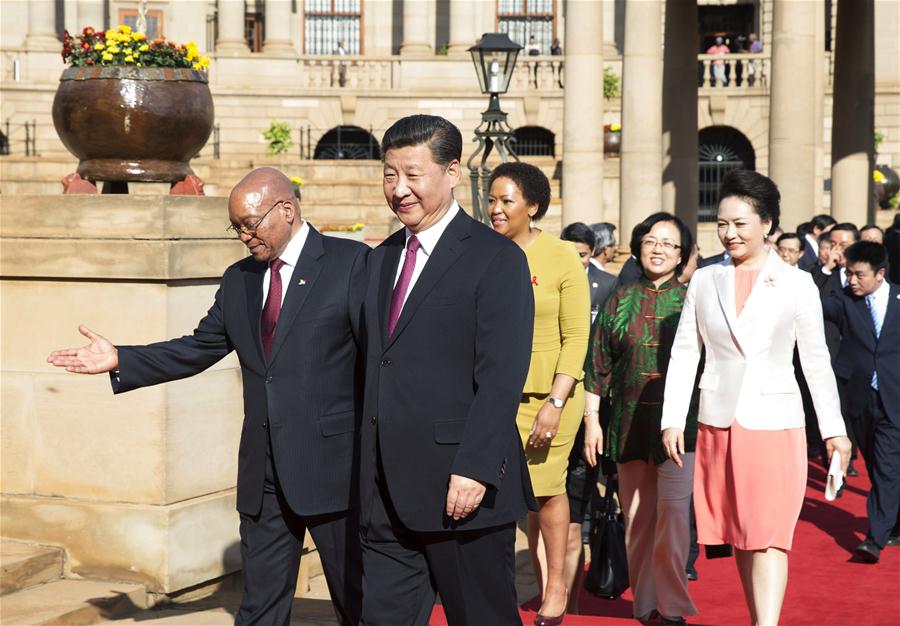


Chinese President Xi Jinping attends a welcoming ceremony held by his South African counterpart Jacob Zuma at the Union Buildings before their talks in Pretoria, South Africa, Dec. 2, 2015. (Xinhua/Huang Jingwen)
GAO Hucheng
Minister of Commerce of China
Co-Honorary Chairman of the Chinese Follow-up Committee for the Forum on China-Africa Cooperation
Bring China-Africa Trade and Economic Cooperation to a new Height
This year marks the fifteenth anniversary of the establishment of the Forum on China-Africa Cooperation. The Johannesburg Summit and the Sixth Ministerial Conference of the Forum (FOCAC) will be held soon in Africa. This is the second summit China and African countries have after the Beijing summit in 2006. President Xi Jinping will join leaders of African countries in discussions on the future of China-Africa relations.
Fifteen years ago China and African countries founded the Forum when we stood in front of the door of 21st century. With the Forum as the core platform for collective dialogue and practical cooperation, China-Africa relations have been developing on a fast track in the new century. The memory of the past is still vivid in our mind. With the Beijing summit and ministerial conferences held, a succession of significant economic and trade measures have been formulated and implemented to strengthen and deepen practical cooperation between the two sides. When Chinese and African people have been reaping real benefits from the cooperation, the whole world has also heard many stories about China-Africa trade and economic cooperation that feature mutual benefit and realize leapfrog development.
At the second Ministerial Conference of the FOCAC held in 2003 China announced to further open its market for Africa by grantingduty-free treatment to particular products of least developed African countries and later the coverage of the duty-free treatment was expanded for several times. Today China is the largest trading partner of Africa and two-way trade hit the historic high of 220 billion US dollars in 2014 which was 21 folds more than the figure in year 2000. From daily necessities like textile and apparel to large equipment and machinery like trains and plains, products “made in China” of high quality and reasonable price offer more choices to African countries and peoples. Similarly, from agricultural products like coffee and wine to bulk commodities like crude oil and minerals, products “made in Africa” of unique national features and comparative advantage are warmly accepted and embraced by Chinese consumers and have enjoyed wider market in China.
At the Beijing Summit and the Third Ministerial Conference of the FOCAC held in 2006 China announced to set up a five billion dollarChina-Africa Development Fund and establish economic and trade cooperation zones in Africa with the view of encouraging and facilitating Chinese investments in Africa. Ever since then Chinese investment in Africa has been growing on a fast trajectory and Africa has become a new hot destination for Chinese investments when Chinese companies invest in a broad range of sectors such as agriculture, telecommunication, energy, processing manufacturing and catering services. By the end of 2014 stock of direct Chinese investment in Africa amounted to USD 32.4 billion, over 60 folds increase from that in 2000. More than 3000 Chinese companieshave invested and started business in Africa. Through investment, they have been helping African countries increase tax revenue, create jobs, adopt applicable technologies and management expertise, and enhance the capability of independent and sustainable development. In particular the China-Africa Development Fund alone has created a million jobs and over 1 billion US dollar tax revenue for Africa. At the same time, investment in Africa hasboosted thegrowth of relevant Chinese industries, facilitated migration of advantageous production capacity, and stimulated the intention and potential of Chinese companies to innovate and operate internationally.
At the Fourth Ministerial Conference of FOCAC held in 2009, China announced a stronger partnership with Africa in agriculture, healthcare, human resource development and education for the purpose of helping Africa improve people’s livelihood and build development capacity. From 2001 to 2015 China has assisted Africa in the development of over 120 educational facilities, nearly 40 agricultural irrigation and water conservancy projects, and over 70 new or upgraded medical and public health facilities. China has provided 3800 services of artemisinin-based anti-malaria medicines. About 80,000 African professionals have taken part in training courses in China to learn China’s development experiences. When Ebola hit Africa in 2014, China was among the first countries to offer help. Through four rounds of emergency humanitarian assistance, China provided medical materials and equipment, built medical treatment centers and bio-labs, and sent medical professionals to work with African friends at the frontline. China’s endeavor is highly commended by the international community and African people in particular. China is now one of Africa’s most important development cooperation partners. Its assistance measures are designed to meet Africa’s need of improvingpeople’s livelihood, do not attach to any political conditions, cover the entire African continent, and therefore are warmly applauded by African people. All this demonstrates China’s commitment to its international obligations and helps create a favorable external environment for China’s own development.
At the Fifth Ministerial Conference of the FOCAC held in 2012, China announced to provide Africa with a loan facility worth 20 billion dollars and to forge partnership with Africa in cross-border/cross-region infrastructure development. Infrastructure development cooperation between China and Africa countries has transformed from bilateral cooperation to regional cooperation, and from construction to integrated operation. Light rail project in Addis Ababa of Ethiopia, Monbasa-Nairobi railway in Kenya, Djibouti Port and Kribi deep-water harbor in Cameron have been put into operation or are being constructed. Africa has become China’s second biggest overseas market of engineering project contracting business. In 2014 Chinese companies completedUSD 53 billion worth of turnover in their engineering contracting business in Africa, roughly 40 percent of total turnover completed in overseas market, and marks a 40-time increase from year 2000. These businesses employed nearly 400 thousand local workers. Connectivity across African countries has been enhanced continuously with the assistance of China. Chinese equipment with high technology contents such as those for rail transport, harbor facility, power generation and communication as well as ships and automobiles have built good brand identity in Africa.
Fifteen years is but a flick of the finger in the long march of human civilization. Nevertheless, the past fifteen years has witnessed extraordinary progress in the evergreen China-Africa friendship. Along with FOCAC, the commercial cooperation between China and Africa has made a quantum leap in what represents a glittering chapter of solidarity and cooperation among developing countries.
A study of the past offers insights into the future. Although China and Africa both face still more daunting tasks for development in even more complex international political and economic situations, it’s been proved by the record of China-Africa business cooperation and the delivery of FOCAC measures that however the international climate and economic dynamics change, Sino-African business links stay robust and vigorous, backed by China’s conscientious delivery of its commitment to African development. Underpinned by the cooperation philosophy of “sincerity, real results, affinity and good faith” and our unbreakable traditional friendship, such ties draw strength from our complementary endowments, strong will and foundation for cooperation, and full confidence in the African economy and the prospects of China-Africa commercial cooperation.
China and Africa share the same development philosophy. Both being members of the developing world, China and Africa are closely linked by common history, development tasks and strategic interests. The Chinese dream pursued by the 1.3 billion Chinese people for national renaissance and the African dream of united strength, development and prosperity cherished by the African people have brought us together and set the stage for cooperation at a higher level.
China and Africa have aligned strategies. China is pushing forward the Belt and Road Initiative for the connection of policies, facilities, trade, finance and peoples between countries involved, whereas Africa has drawn up Agenda 2063 aimed at a prosperous Africa of inclusive growth and sustainable development. The development goals of the two sides echo with each other and afford opportunities for cooperation of higher standards.
China and Africa both enjoy strong economic growth. While China is the world’s second largest economy, Africa is among the fastest growing regions of the world. Having weathered the international economic and financial crisis, both show great resilience in growth potentials. As two growth engines for the world economy moving forward, China and Africa, through continuous economic growth, have renewed the impetus for taking their cooperation to the next level while creating huge value and unleashing more opportunities.
China-Africa cooperation is complementary. With China and Africa in successive development stages, China can offer goods that are daily necessities for African people, technology and equipment that meet Africa’s development needs, and development experience for Africa’s reference. China’s diversified consumer needs and advantageous capacity also represent broad markets for African goods and rich choices for Africa’s industrialization process. The complementarity between the two sides in capital, equipment, technology, experience, market, resources and labor enables China and Africa to draw upon each other’s strengths, paving the way for Sino-African cooperation of a higher level.
As a Chinese saying goes, “True friendship exists only when there is an abiding commitment to pursue common goals.” The more China develops, the more it needs Africa, and vice versa. In sync with the 21st Century, FOCAC is standing at a new staring point. The upcoming Johannesburg Summit will mark a milestone for renewing and upgrading China-Africa relationship. Taking this opportunity, China will join Africa in drawing a new cooperation blueprint for broader and deeper China-Africa commercial cooperation that will strengthen the foundation and diversify the substances of Sino-African relationship.
——Identify convergence for cooperation. To continuously advance China-Africa business cooperation, top-down design is of paramount importance for aligning efforts. While welcoming African countries to take part in its Belt and Road Initiative, China will actively echo Agenda 2063 and the development programs of African countries to coordinate and deploy commercial cooperation between the two sides more precisely at a higher level and for a longer term. China stands ready to further its communication and coordination with African countries and fully leverage the multilateral and bilateral business cooperation mechanisms between China and Africa in strategic research, priority design and path-finding to take Sino-African commercial cooperation higher and farther.
——Solidify the fundamentals of cooperation. For sustained China-Africa commercial cooperation, the traditional areas of China-Africa commercial cooperation need to be strengthened and enhanced. Upholding the right outlook on righteousness and benefit, China will consolidate its cooperation outcomes with African countries in people’s livelihoods and continue to do its best in support of African healthcare, culture and education, environmental protection, agriculture and poverty relief while sharing its success stories. China is ready to deepen its cooperation with Africa in infrastructure by further leveraging Chinese comparative advantages in project design, construction, equipment, management and operation. With reference to African needs for railways, highways, ports and power, efforts will be made to transform and upgrade China-Africa infrastructure cooperation.
——Foster growth spots in cooperation. For China-Africa cooperation to move forward continuously, new fronts need to be opened and new potentials explored for cooperation based on the development-stage-specific characteristics of China and Africa and the calls of the times. China stands ready to deepen international capacity cooperation with Africa by encouraging Chinese companies to engage in capacity cooperation and investment in Africa in, among others, steel, construction materials, cement and glass. The development of commercial cooperation zones will be stepped up to accelerate African industrialization. Besides, China will guide and encourage businesses to play an active role in Africa’s aviation, tourism, new energy, e-commerce and finance, so as to open new spaces, renew the impetus and raise the standards for our cooperation.
It is foreseeable in the near future that amidst the tides of world peace and development, as China navigates the development of Belt and Road and Africa forges towards development and prosperity, China-Africa commercial cooperation will sail towards an even brighter future.

Day|Week